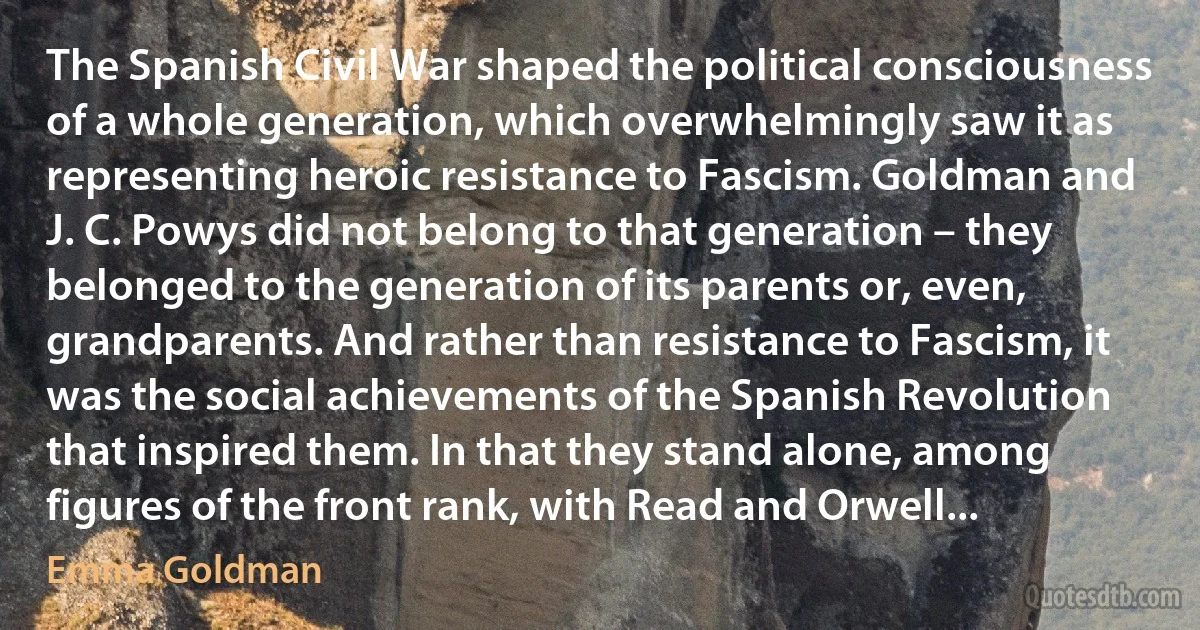Orwell Quotes - page 2
George Orwell wrote in 1942 at the height of his revulsion from what he regarded as the feeble hypocrisy of English socialist journalism. If he were alive today he would no doubt derive much ironic amusement from the changed position in popular esteem of the Boers in this half-century from that of the gallant little people fighting for their homesteads and way of life to that of the villains of apartheid.

Evelyn Waugh
Our prison system, the world's largest, is filled with the destitute. There is no shortage of artists, intellectuals, and writers, from Martin Bubar and George Orwell to James Baldwin, who warned us that this dystopian era was fast approaching. But in our Disneyland world of intoxicating and endless images, cult of the self and willful illiteracy, we did not listen. We will pay for our negligence.

Chris Hedges
There were a lot of utopias in the nineteenth century, wonderful societies that we might possibly construct. Those went pretty much out of fashion after World War I. And almost immediately one of the utopias that people were trying to construct, namely the Soviet Union, threw out a writer called Zamyatin who wrote a seminal book called We, which contains the seeds of Orwell and Huxley. Writers started doing dystopias after we saw the effects of trying to build utopias that required, unfortunately, the elimination of a lot of people before you could get to the perfect point, which never arrived. ... I don't believe in a perfect world. I don't believe it's achievable, and I believe the people who try to achieve it usually end up turning it into something like Cambodia or something very similar because purity tests set in. Are you ideologically pure enough to be allowed to live? Well, it turns out that very few people are, so you end up with a big powerful struggle and a mass killing scene.

Margaret Atwood
Something I think you're very conscious of growing up in the South is people who speak correctly and people who don't...George Orwell said, ‘Englishmen are all branded on the tongue.' It's the same for southerners. I grew up around people who had wonderful, mellifluous voices; there's also that twangy cracker accent. And then you were also aware of black English...

Donna Tartt
The shortage of public intellectuals (in the English-speaking world) goes back to the decline of the written media: the first TV intellectual was Foucault, who was at home in both media, but his successors and imitators know only the camera. This forces sound bites upon even the most complex material: see Schama, Ferguson e tutti quanti. Also, and paradoxically: public intellectuals are best when they are grounded in a particular language, culture, debate. Thus Camus was French, Habermas is German, Sen is Bengali, Orwell was deep English. This made their cross-frontier ventures plausible, in the same way that Havel or Michnik today have street cred because they started out as courageous dissidents in a very particular time and place. The opposite is the ridiculous Slavoj Zizek: a "global”' public intellectual who is therefore of no particular interest in any one place or on any one subject. If he is the future of public intellectuals, then they have no future.

Slavoj Žižek
In the book 1984, George Orwell pictured a totalitarian society that has become the standard view of the total state of the future. Everyone's life was controlled by computer, and there was a TV camera in every room to monitor everyone's activities... Fortunately, such dramas overlook the fundamentals of economics. The larger the government, the less efficient and productive is the economy. Slaves don't produce with the enthusiasm, incentive, and imagination that free people do. Bureaucratic programs just don't work as intended... So while the totalitarian state may include a TV camera in every room, I doubt that the camera will work.

Harry Browne
It goes back to the days when we were defending ourselves against the internal aggression of the Native American population, who we incidentally wiped out in the process. In the post World War II period, we've frequently had to carry out defense against internal aggression, that is against Salvadorans in El Salvador, Greeks in Greece, against Filipinos in the Philippines, against South Vietnamese in South Vietnam, and many other places. And the concept of internal aggression has been repeatedly invoked in this connection, and quite appropriately. It's an interesting concept, it's one that George Orwell would certainly have admired, and it's elaborated in many ways in the internal documentary record.

Noam Chomsky


